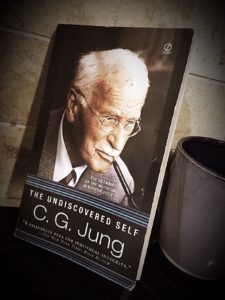
Undiscovered Self (Carl Jung)
I love reading. And I’m such a psychology nerd that some of my favorite things to read are the classic texts written by the fathers and mothers of psychology and psychotherapy. So, in case you might want to read some of these – I’ll give you some glorious snippets as I come across them to entice you. (And for those who really don’t want to read these kinds of things, maybe still some good quotes to spice up your consultation meetings and help you feel psychologically erudite.) ?
Carl Jung’s The Undiscovered Self: The Dilemma of the Individual in Modern Society (1957)
This is a tiny, punchy little book! Coming in at just 112 pages, it’s pretty easy to read and fits nicely in a purse or laptop bag! Here’s one of my favorite lessons:
Individual reality can’t be expressed by statistical averages; every therapy client is a completely unique creature and needs to be treated as such.
The more a theory lays claim to universal validity, the less capable it is of doing justice to the individual facts. Any theory based on experience ins necessarily statistical; that is to say, it formulates an ideal average which abolishes all exceptions at either end of the scale and replaces them with an abstract mean. This mean is quite valid, though it need not necessarily occur in reality. … The exceptions at either extreme, though equally factual, do not appear in the final result at all, since they cancel each other out. (p. 7) … While [the average is] reflecting an indisputable aspect of reality, it can falsify the actual truth in a most misleading way. … Not to put too fine a point on it, one could say that the real picture consists of nothing but exceptions to the rule, and that, in consequence, absolute reality has predominantly the character of irregularity. … There is and can be no self-knowledge based on theoretical assumptions, for the object of self-knowledge is an individual – a relative exception and an irregular phenomenon. (p. 8) If I want to understand an individual human being, I must lay aside all scientific knowledge of the average man and discard all theories in order to adopt a completely new and unprejudiced attitude. …If the psychologist wants not only to classify his patient scientifically but also to understand him as a human being, he is threatened with a conflict of duties between the two diametrically opposed and mutually exclusive attitudes of knowledge, on the one hand, and understanding, on the other. This conflict cannot be solved by an either-or but only by a kind of two-way thinking: doing one thing while not losing sight of the other. (pp. 9-10)
That’s all I’ll give you here, but you should read it for these other gems:
- How communism and capitalism both devalue the individual while purporting to do the opposite
- How religion really exists through experience only, not dogma
- The problem with ignoring your shadow and the good that can come from it
- How art prophesies cultural shifts
Yes! All of that in this teensy, tiny book. Enjoy!
Comment below if you’ve read this book, or any Jung, and give your favorite quotes!